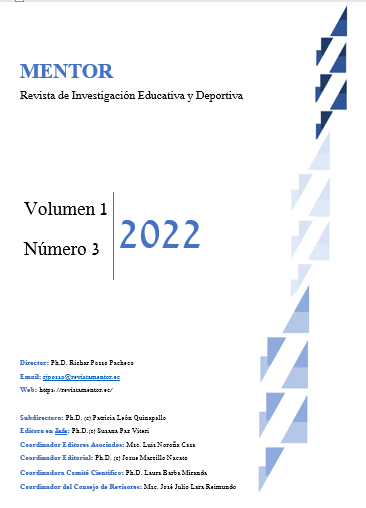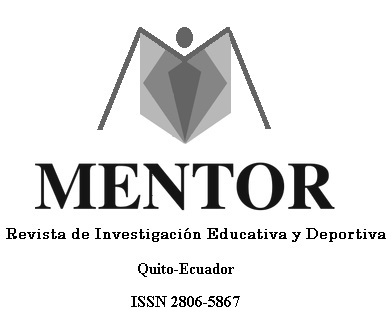The level of physical activity and its relationship with academic stress in university students
DOI:
https://doi.org/10.56200/mried.v1i3.2244Keywords:
Physical activity, academic stress, university studentsAbstract
The present research aims to determine the relationship between the level of physical activity and academic stress in 7th-semester students from the Faculty of Physical Culture at the Central University of Ecuador in the 2021 period. A total of 30 university students voluntarily participated in the study. A Likert-scale questionnaire was used with two variables: the level of physical activity and academic stress. The results revealed a weak negative correlation between the variables of Physical Activity and Academic Stress in the 7th-semester students of the Faculty of Physical Culture at the Central University of Ecuador. Additionally, it was found that the prevalence of physical activity was 53.33%, indicating a high level, while academic stress was 33.33%, indicating a moderate level among the 7th-semester students. It is concluded that academic stress is somehow associated with the practice of physical activity among the students in this particular study. Therefore, this research is important as it will help implement physical activity programs or other strategies aimed at strengthening the necessary resources for students to cope with a satisfactory university life.
Downloads
References
Barraza, A. (2006). Un modelo conceptual para el estudio del estrés académica. Revista Electrónica de Psicología Iztacala, 9(3), 110–129. https://www.iztacala.unam.mx/carreras /psicologia/psiclin/vol9num3/art6vol9no3.pdf
Cargua García, A. X., Posso-Pacheco, R. J., Cargua García, N. I. y Rodríguez Torres, Á. F. (2019). La formación del profesorado en el proceso de innovación y cambio educativo. OLIMPIA. Revista de la Facultad de Cultura Física de la Universidad de Granma, 16(54), 140-152. http://www.ub.edu/obipd/la-formacion-del-profesorado-en-el-proceso-de-innovacion-ycambio-educativo/
Castillo Contreras, L. A., & Vivancos Condori, J. (2019). Hábitos alimentarios, actividad física y nivel de estrés académico en estudiantes de una universidad privada de Lima Este 2019, [Tesis pregrado, Universidad Peruana Unión]. Repositorio UPeU https://repositorio.upeu.edu.pe/bitstream/handle/20.500.12840/1943/Luis_Tesis_Licenciatura_2019.pdf?sequence=1&isAllowed=y
Fernández, C. y Baptista, P. (2010). Metodología de la investigación. Mc. Grau Hill.
George, D. (2003). Science and Education. http://www.sciepub.com/reference/65129
Lerma, H. (2009). Metodología de la investigación. Ecoe Ediciones
Organización Mundial de la Salud. (2018). Inactividad física: un problema de salud pública mundial. https://www.who.int/es/news-room/fact-sheets/detail/physical-activity
Pimienta, C. C., de la Cruz, T. C. y Díaz-Véliz, G. (2016). Ansiedad y fuentes de estrés académico en estudiantes de carreras de la salud. Investigación en educación médica, 5(20), 230-237. https://www.scielo.org.mx/scielo.php?pid=S2007-50572016000400230&script=sci_abstract
Posso-Pacheco, R. J. (2018a). Propuesta de estrategias metodológicas activas aplicadas a la educación física (Master'sthesis). https://reunir.unir.net/handle/123456789/7439
Posso, R. (2018b). Propuesta de Estrategias Metodológicas aplicadas a la Educación Física (Tesis de maestría). Universidad Internacional de la Rioja. https://reunir.unir.net/handle/123456789/7439
Posso, R. J., Marcillo, J. C. y Bedón, E. D. (2021). Las tecnologías de la Información y comunicación como alternativa para el entrenamiento en la pandemia. Revista científica Olimpia, 18(2), 1090-1100. https://revistas.udg.co.cu/index.php/olimpia/article/view/2682
Posso Pacheco, R., Villarreal Arias, S., Marcillo Ñacato, J., Carrera Toapanta, P., y Morales Pérez, N. (2021). Inteligencias múltiples como estrategia para la Educación Física: una intervención didáctica durante la pandemia. PODIUM - Revista de Ciencia y Tecnología en la Cultura Física, 17(1), 120 - 131. https://podium.upr.edu.cu/index.php/podium/article/view/1184
Posso, R., Lara, L., López., S. y Garcés, R. (2022). Objetivo de desarrollo sostenible acción por el clima: un aporte desde la Educación Física. Ciencia y Deporte.7(2), 34 – 45. http://www.dspace.uce.edu.ec/bitstream/25000/25953/1/22%20POSSO-LARA-LOPEZ%20OBJETIVO%20DE%20DESARROLLO.pdf
Posso, R., Barba, L., Paz, B., Pereira, M., León, X., Ortiz, N. y Noroña, L. (2022) Exclusión del ejercicio físico desde la mirada de las TIC. Unidad de Publicaciones de la UPEL IPB. https://doi.org/10.46498/upelipb.lib.0011
Santillán Obregón, R. R., Asqui Luna, J. E., Casanova Zamora, T. A., Santillán Altamirano, H. R., Amparo Obregón, G., & Vásquez Cáceres, M. G. (2018). Nivel de actividad física en estudiantes de administración de empresas y medicina de la ESPOCH. Revista Cubana de Investigaciones Biomédicas, 37(4), 0-0. http://scielo.sld.cu/scielo.php?script=sci_arttext&pid=S0864-03002018000400015
Valenzuela, M. C. S., Gallegos, L. I. F., Baca, L. R. L., López, H. L. M. y Rico, F. J. F. (2021). Estrés académico en universitarios y la práctica de ejercicio físico-deportivo. Revista Publicando, 8(28), 1-8. https://revistapublicando.org/revista/index.php/crv/article/view/2175
Published
How to Cite
Issue
Section
License
Copyright (c) 2022 MENTOR revista de investigación educativa deportiva

This work is licensed under a Creative Commons Attribution-NonCommercial-NoDerivatives 4.0 International License.











